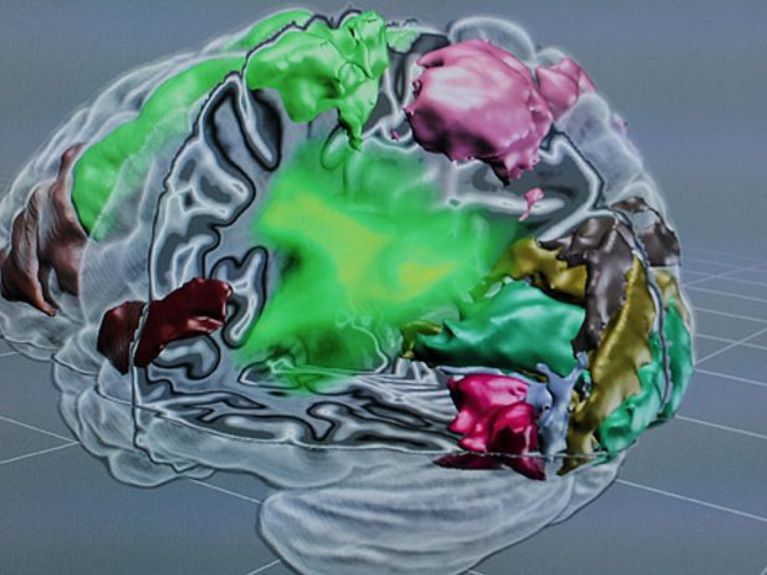Interview
Can brain scans detect political attitudes?

Picture: FZJ
According to a new study, political ideologies are associated with certain patterns found in brain scans. But what do these patterns really show? Here are some thoughts from Simon Eickhoff of the Research Center Jülich.
Prof. Eickhoff, it is said to be possible to infer a person's political views from MRI image scans of the brain, or at least that is the finding of a recent study by scientists at Ohio State University. You are also conducting research in this area. How did the researchers in Ohio go about their study?
They used so-called functional MRI: This shows which regions in the brain are active. The processes in the brain were recorded over a certain period of time while the test subjects, whose political views had previously been identified by means of questionnaires and self-assessments, solved various tasks that were associated with empathy and emotions, among other things. Algorithms were then used to analyze the brain scans for patterns. The study involved 170 subjects, which is quite a large number for a study of this kind, but is still far too few subjects for a study of high statistical significance.
Nevertheless, the study did find evidence of patterns that occurred significantly more often in people with certain political views. Does this mean that some patterns can be "translated" into a political attitude?
Indeed, the patterns of people with certain political attitudes seem to be similar. But that does not mean that it is the political attitude alone, among many other factors, that generates these particular patterns.
Please explain in more detail.
Most of our traits are related to many other factors, especially when it comes to complex constructs like political attitudes. Therefore, it is difficult and reductive to attribute a pattern, even if it appears more frequently in certain political attitudes, specifically to a particular political ideology. This is because there are numerous factors that we know significantly influence political attitudes, and probably brain scans. And we don't know whether such factors are behind the patterns we find in the scans and therefore the tendency towards a political sentiment is then just a consequence of these factors.
Simon Eickhoff. Picture: FZJ
Which factors have a particularly strong influence on political sentiment?
Studies show that childhood and family in particular have a major influence; whether you grew up in a more conservative, religious home; whether you had a strict or less strict upbringing; whether you grew up in the country or in the city; all this also leaves its mark on the brain and shapes political attitudes. The social environment outside the family, both in childhood and at work later on, also plays a major role, as does socioeconomic background. And we know from numerous studies in the U.S. that ethnicity and experiences of discrimination can have a formative effect on both the brain and political views.
But in the brain patterns can still be seen, despite the multi-faceted influencing factors.
It seems that there are certain archetypes, that is, biographies that are similar to each other, and possibly have a tendency to produce certain patterns over time. But political attitudes are only a small part of this, to which one should not attribute the patterns found. Otherwise, it would be as if we saw the silhouette of a person and said, "There is clearly a hand here." In this case, a hand is indeed also to be seen, but more accurately it is a whole human being. An observation based on this kind of conclusion is always prone to error.Here we are only dealing with tendencies, not with fixed characteristics such as hair color. And in any case, there are significantly more factors of variance in biography and neurobiology than there are colors or political sentiments.
How meaningful, then, can any conclusions at all be drawn from patterns found in the brain to political sentiments?
The patterns do not allow any conclusive statements to be made, but there are certain tendencies that can be found in the brain, even in the case of complex characteristics such as personality or political views. The colleagues from Ohio State University have, in a way, revealed a kind of indicator of political attitude in the brain through the correlation they found, except that this does not have to be specific to political attitude, but could represent many other factors. I think this is the way to treat results from brain scans in terms of complex traits in the medium-term future: They don't provide reliable results, but they do reveal directions. And that can have many uses in the future.
Where, for example?
Whenever it is necessary to get a better insight into the "inner characteristics" of a person. At the doctor's office, in court, or, for example, in benefit allowance applications due to chronic pain. But, importantly: The interpretations of the brain scans are just tendencies that can contribute towards a more complex evaluation. A judgment based solely on the results of the analysis of brain scans will not be possible in the foreseeable future.
Don't you also see dangers in imagining this instrument ending up a bit more sophisticated in the hands of an authoritarian state?
Well, the means to accurately interpret the findings of the scans are still far too elaborate and too imprecise to be used on a large scale. And if it's just a matter of taking certain people out of circulation, then authoritarian states don't really need such complex justification.
Readers comments